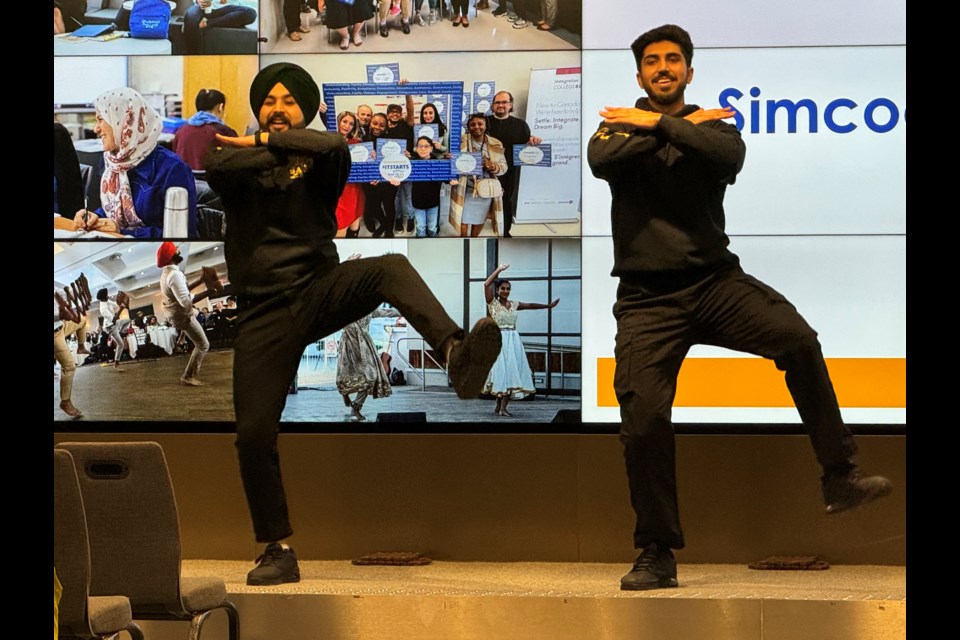After a decade in the works, the County of Simcoe officially launched its new community settlement strategy this week.
The new plan was shared during an event at Georgian College’s Barrie campus on Monday and featured a presentation by Sunil Johal, professor of public policy and society at the University of Toronto. There were also performances by the Heluo Wushu Academy and the Simcoe Arts and Culture Academy.
County officials say the new strategy will guide the Simcoe County Local Immigration Partnership (LIP) as well as program development for service organizations. It will also assist the county as it continues to support the creation of welcoming communities by improving immigrant experiences living, working and belonging in county. Details of the plan can be found here.
The launch served as an opportunity to show the work the LIP does, as well as the county’s future plans, explained Mina Fayez-Bahgat, general manager of social and community services.
“Bringing a strategy like this together brings a lot of collaboration, alignment and focus on who we want to support and how we want to support them,” he said.
With a population of more than 530,000, the county is expected to experience significant growth in the future, said Warden Basil Clarke. The county is estimated to see that number soar to 900,000 by 2051.
“At this point, there are more than 82,000 immigrants that call Simcoe County home. The word is out there that Simcoe County is a great place to live. Not only do folks want to come to Canada, but Simcoe County’s numbers have doubled in new Canadians since 2016. This is the place where people want to settle, and that’s why we are prioritizing the experience of what it is to be in Simcoe County,” Clarke said.
“We don’t know what the next 10 years will bring, but I truly do look forward to hearing how much continued progress we will make in Simcoe County and how much these newcomers will contribute to the family that we call Simcoe County.”
Georgian College is proud to be a champion and a leader for immigration in the region, said Kevin Weaver, the college’s president and CEO, as well as co-chair of the Simcoe County Local Immigration Partnership Council.
“The County of Simcoe’s new community strategy will guide our efforts as we continue to work together to create welcoming communities, support improved co-ordination and the delivery of integration services for newcomers, celebrate diversity and foster meaningful living and working experiences that inspire inclusivity and belonging,” he said.
Georgian has become a “global college” over the past decade, added Weaver, and is home to people from all over the world, including 6,300 international students on an annual basis from more than 85 countries and speaking 50-plus languages.
“They are choosing to study here at Georgian and they’re choosing it because of the great work that’s happening here at the county,” he said.
Weaver added the college has heard consistently from employers that it needs to grow within its programs and support workplace challenges currently being faced by many industries.
“We know we need those international students more than ever to meet the demands of our local labour force and to help grow and strengthen our local economy,” he said.
Fellow co-chair and New Tecumseth Deputy Mayor Stephanie MacLellan said newcomers are an important part of the continued growth and success of her community and beyond.
“We strive to use the settlement strategy as a tool to make sure newcomers are not only welcomed with open arms, but also have the services and supports needed to help them thrive in their communities,” she said. “But there is always work to be done.”
The new strategy serves as a road map to improving the settlement experience for newcomers, MacLellan said.
“By embracing newcomers, communities can benefit from enhanced labour force, economic development opportunities and increased cultural experiences,” she added.
Atop the county’s “to-do list” for 2024, said Fayez-Bahgat, is moving forward on the development of a multicultural centre in the region.
“We want to become a recognized resettlement community. We want to be funded provincially and federally to do English-language assessments … so people aren’t waiting to get jobs,” he added. “This is one of those passion projects part of the portfolio that I get to (take part in).”



